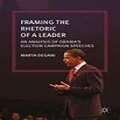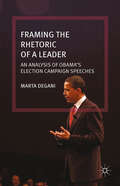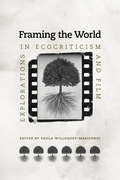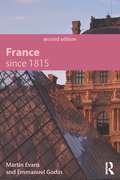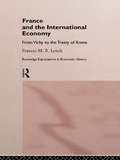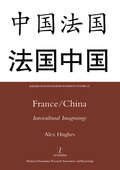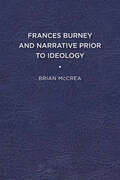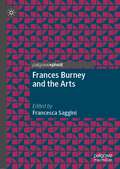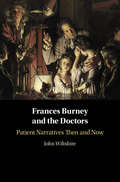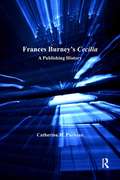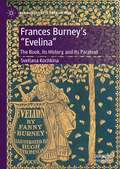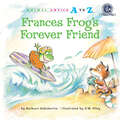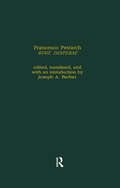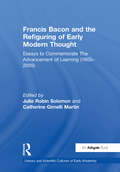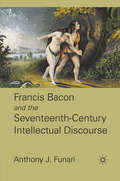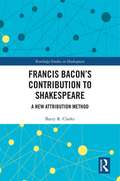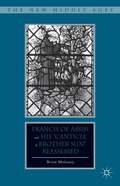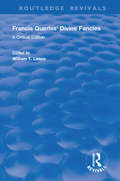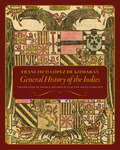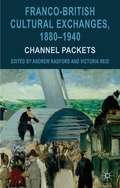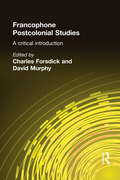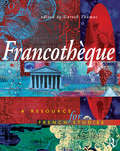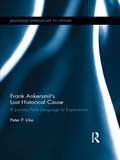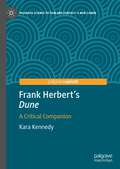- Table View
- List View
Framing the Rhetoric of a Leader
by Marta DeganiBased on a selection of 30 election campaign speeches during Obama's first run for the American presidency in 2008, this book investigates the Democratic presidential candidate's much celebrated rhetoric from a cognitive semantics point of view.
Framing the Rhetoric of a Leader: An Analysis of Obama’s Election Campaign Speeches
by M. DeganiBased on a selection of 30 election campaign speeches during Obama's first run for the American presidency in 2008, this book investigates the Democratic presidential candidate's much celebrated rhetoric from a cognitive semantics point of view.
Framing the World: Explorations in Ecocriticism and Film (Under the Sign of Nature: Explorations in Ecocriticism)
by Paula Willoquet-MaricondiThe essays in this collection make a contribution to the greening of film studies and expand the scope of ecocriticism as a discipline traditionally rooted in literary studies. In addition to highlighting particular films as productive tools for raising awareness and educating us about environmental issues, Framing the World: Explorations in Ecocriticism and Film encourages its readers to become more ecologically minded viewers, sensitive to the ways in which films reflect, shape, reinforce, and challenge our perceptions of nature, of human/nature relations, and of environmental issues. The contributors to this volume offer in-depth analyses of a broad range of films, including fictional and documentary, Hollywood and independent, domestic and foreign, experimental and indigenous. Drawing from disciplines including film theory, ecocriticism, philosophy, rhetoric, environmental justice, and American and Indigenous studies, Framing the World offers new and original approaches to the ecocritical study of cinema. The twelve essays are gathered in four parts, focusing on ecocinema as activist cinema; the representation of environmental justice issues in Hollywood, independent, and foreign films; the representation of animals, ecosystems, and natural and human-made landscapes in live action and animation; and ecological themes in the films of two eco-auteurs, Kiyoshi Kurosawa and Peter Greenaway. Willoquet-Maricondi's introduction provides an overview of the field of ecocriticism and offers both philosophical and theoretical foundations for the ecocritical study of films.ContributorsBeth Berila, St. Cloud State University * Lynne Dickson Bruckner, Chatham College * Elizabeth Henry, University of Denver * Joseph K. Heumann, Eastern Illinois University * Harri Kilpi, University of East Anglia * Jennifer Machiorlatti, Western Michigan University * Mark Minster, Rose-Hulman Institute of Technology * Robin L. Murray, Eastern Illinois University * Tim Palmer, University of North Carolina, Wilmington * Cory Shaman, Arkansas Tech University * Rachel Stein, Siena College * Paula Willoquet-Maricondi, Marist College
Fran Grabs It: Buildup Unit 3 Lap Book (Buildup Ser.)
by Sara Palacios Cindy Peattie Martin AkersNIMAC-sourced textbook
France Since 1815, Second Edition
by Martin Evans Emmanuel GodinPart of the Modern History for Modern Languages Series France since 1815 provides an accessible overview of the major socio-political changes in France during this period. Designed for area studies students studying French, it presents the historical context necessary for language students to understand the complexities of contemporary French society. Adopting a chronological approach, it surveys nearly two hundred years of French history, with events covered including The French Revolution, The Bourbon Restoration, The Third Republic, Occupied France, The Fourth Republic, The Gaullist Revolution and France after 2003. This revised edition includes new material that focuses on Chirac's second mandate (Iraq war, religion, suburbs and the inability/impossibility of carrying on with reform), an assessment of the controversial Sarkozy presidency, and a final chapter covering the last ten years, culminating in the results of the French presidential elections in 2012. Features include: clear timelines of main events and suggested topics for discussion glossary inserts throughout of key terms and concepts the use of primary documents to re-create and understand the past free access to a website (http://www.port.ac.uk/special/france1815to2003/) containing a wealth of complementary material Drawing on the best scholarship, particular emphasis has been given to the role of political memory, the contribution of women and the impact of colonialism and post-colonialism. The relationship between France and her European partners is analysed in greater depth and there are new sections explicitly situating France and the French within a wider transnational/global perspective.
France and the International Economy: From Vichy to the Treaty of Rome (Routledge Explorations in Economic History)
by Frances LynchThis is a comprehensive history of a critically formative period in French economic history. Frances Lynch covers topics such as the post-war negotiations for American aid, the reconstruction of a capital market, the modernization of French agriculture, the liberalization of trade in the 1950s and subsequent economic growth.
France/China: Intercultural Imaginings
by Alex HughesChina has long been an object of fascination for the French, who celebrated theirannee de la Chine in 2004. Symptomatic of that fascination are the movements into China made by groups as diverse as the Jesuits, who arrived inL'Empire du Milieu in the late seventeenth century, and theTel Quel intellectuals, whose will to political pilgrimage took th
Frances Burney and Narrative Prior to Ideology
by Brian McCreaFrances Burney and Narrative Prior to Ideology works between Burney’s Journals and Letters and her fiction more thoroughly than any study of her in the past twenty-five years. By doing so, it offers significant reinterpretations of Burney’s four novels: Evelina, Cecilia, Camilla, and The Wanderer. It describes Burney’s eluding the major modern–isms through which critics have tried to read her: Feminism (with its “gendering” of beauty and reversal of gender roles); Capitalism and its Marxist critique (here the details of Burney’s housekeeping become important); Professionalism (as a response to status inconsistency and class conflict); and Ian Watt’s “Formal Realism” (Burney perhaps saved the novel from a sharp decline it suffered in the 1770s, even as she tried to distance herself from the genre). Burney’s most successful writing appeared before the coining of “ideology.” But her standing “prior to ideology” is not a matter of chronological accident. Rather, she quietly but forcefully resisted shared explanations—domesticity as model for household management, debt as basis for family finance, professional status as a means to social confidence, the novel as the dominant literary genre—that became popular during her long and eventful life. Frederic Jameson has described Paul de Man, “in private conversation,” claiming, “Marxism . . . has no way of understanding the eighteenth century.” Frances Burney and Narrative Prior to Ideology conjoins Burney’s “eighteenth-centuryness” with her modernity. Published by University of Delaware Press. Distributed worldwide by Rutgers University Press.
Frances Burney and the Arts: Frances Burney And The Theater Arts
by Francesca SagginiThis collection of essays by leading scholars in Burney studies provides an innovative, interdisciplinary critical consideration of the relationship of one of the major authors of the long English Romantic period with the arts. The encounter was not devoid of tensions and indeed often required a degree of wrangling on Burney’s part. This was a revealing and at times contentious dialogue, allowing us to reconstruct in an original and highly focused way the feminine negotiation with such key concepts of the late Enlightenment and Romanticism as virtue, reputation, creativity, originality, artistic expression, and self-construction. While there is now a flourishing body of work on Frances Burney and, more broadly, Romantic women authors, this book concentrates for the first time on the rich artistic and material context that surrounded, supported, and shaped Frances Burney’s oeuvre.
Frances Burney and the Doctors: Patient Narratives Then and Now
by John WiltshireFrances Burney is primarily known as a novelist and playwright, but in recent years there has been an increased interest in the medical writings found within her private letters and journals. John Wiltshire advocates Burney as the unconscious pioneer of the modern genre of pathography, or the illness narrative. Through her dramatic accounts of distinct medical events, such as her own infamous operation without anaesthetic, to those she witnessed, including the 'madness' of George III and the inoculation of her son against smallpox, Burney exposes the ethical issues and conflicts between patients and doctors. Her accounts are linked to a range of modern narratives in which similar events occur in the changed conditions of the public hospital. The genre that Burney initiated continues to make an important contribution to our understanding of medical practice in the modern world.
Frances Burney's Cecilia: A Publishing History (Ashgate Studies In Publishing History: Manuscript, Print, Digital Ser.)
by Catherine M. ParisianIn her exhaustive publishing history of Frances Burney's Cecilia, Or Memoirs of an Heiress, Catherine Parisian mines an extensive archival record that includes portions of the original manuscript, annotated page proofs, legal records relative to its copyright, and an abundance of letters, to chronicle the novel's composition, printing, and publication from its first edition in 1782 to the present-day Oxford World's Classics paperback. Generally regarded on its publication as the most important novel since Tobias Smollett's Humphrey Clinker, Cecilia is a deft blend of the satire of Henry Fielding with the sentimentality of Samuel Richardson that brings a female perspective to the novel while perceptively probing class and gender relations in eighteenth-century British society. Parisian combines the methods of the book historian with those of the bibliographer to show how the two usefully inform one another and bear on the interpretation of the literary text. Examining 51 different editions of Cecilia, Parisian considers what these editions reveal about Cecilia's reading audiences and what insights these books provide into the printing and publishing trends of the past 200 years. Lavishly illustrated and accessibly written, her timely history demonstrates the importance of Cecilia to the art of the novel and the history of the book.
Frances Burney’s “Evelina”: The Book, its History, and its Paratext (New Directions in Book History)
by Svetlana KochkinaEvelina, the first novel by Frances Burney, published in 1778, enjoys lasting popularity among the reading public. Tracing its publication history through 174 editions, adaptations, and reprints, many of them newly discovered and identified, this book demonstrates how the novel’s material embodiment in the form of the printed book has been reshaped by its publishers, recasting its content for new generations of readers. Four main chapters vividly describe how during 240 years, Evelina, a popular novel of manners, metamorphosed without any significant alterations to its text into a Regency “rambling” text, a romantic novel for “lecteurs délicats,” a cheap imprint for circulating libraries, a yellow-back, a book with a certain aesthetic cachet, a Christmas gift-book, finally becoming an integral part of the established literary canon in annotated scholarly editions. This book also focuses on the remodelling and transformation of the paratext in this novel, written by a woman author, by the heavily male-dominated publishing industry. Shorter Entr’acte sections discuss and describe alterations in the forms of Burney’s name and the title of her work, the omission and renaming of her authorial prefaces, and the redeployment of the publisher’s prefatorial apparatus to support particular editions throughout almost two-and-a-half centuries of the novel’s existence. Illustrated with reproductions of covers, frontispieces, and title pages, the book also provides an illuminating insight into the role of Evelina’s visual representation in its history as a marketable commodity, highlighting the existence of editions targeting various segments of the book market: from the upper-middle-class to mass-readership. The first comprehensive and fully updated bibliography of English and translated editions, adaptations, and reprints of Evelina published in 13 languages and scripts appears in an appendix.
Frances Frog's Forever Friend (Animal Antics A to Z)
by Barbara deRubertisFrances Frog is very funny! But sometimes she is a little foolish. Her favorite friend, Felicity Fox, helps Frances learn what it means to be a good friend . . . a forever friend!
Francesco Petrarch Rime Disperse (Library of Medieval Literature #Ser. A)
by Joseph A. BarberFirst published in 1991. It was the lyric poetry of Petrarch that popularized the sonnet in European literature, that set the standard for love poetry for centuries to follow. Compared to the large volume of prose, poetry and notes in Latin, the corpus of Petrarch’s Italian writings is small: the 366 poems that make up the Canzoniere, the 2000 or so verses of the Trionfi, and an undetermined number of poems, drafts and fragments that comprise what we call the Rime disperse. This collection includes indexes of first lines in both Italian and English.
Francis Bacon and the Refiguring of Early Modern Thought: Essays to Commemorate The Advancement of Learning (1605–2005) (Literary and Scientific Cultures of Early Modernity)
by Catherine Gimelli MartinCommemorating the 400th anniversary of the publication of Francis Bacon's Advancement of Learning (1605), this collection examines Bacon's recasting of proto-scientific philosophies and practices into early modern discourses of knowledge. Like Bacon, all of the contributors to this volume confront an essential question: how to integrate intellectual traditions with emergent knowledges to forge new intellectual futures. The volume's main theme is Bacon's core interest in identifying and conceptualizing coherent intellectual disciplines, including the central question of whether Bacon succeeded in creating unified discourses about learning. Bacon's interests in natural philosophy, politics, ethics, law, medicine, religion, neoplatonic magic, technology and humanistic learning are here mirrored in the contributors' varied intellectual backgrounds and diverse approaches to Bacon's thought.
Francis Bacon and the Seventeenth-Century Intellectual Discourse
by Anthony J. FunariThis book explores the resistance of three English poets to Francis Bacon's project to restore humanity to Adamic mastery over nature, moving beyond a discussion of the tension between Bacon and these poetic voices to suggest theywere also debating the narrative of humanity's intellectual path.
Francis Bacon’s Contribution to Shakespeare: A New Attribution Method (Routledge Studies in Shakespeare)
by Barry R. ClarkeFrancis Bacon's Contribution to Shakespeare advocates a paradigm shift away from a single-author theory of the Shakespeare work towards a many-hands theory. Here, the middle ground is adopted between competing so-called Stratfordian and alternative single-author conspiracy theories. In the process, arguments are advanced as to why Shakespeare’s First Folio (1623) presents as an unreliable document for attribution, and why contemporary opinion characterised Shakspere [his baptised name] as an opportunist businessman who acquired the work of others. Current methods of authorship attribution are critiqued, and an entirely new Rare Collocation Profiling (RCP) method is introduced which, unlike current stylometric methods, is capable of detecting multiple contributors to a text. Using the Early English Books Online database, rare phrases and collocations in a target text are identified together with the authors who used them. This allows a DNA-type profile to be constructed for the possible contributors to a text that also takes into account direction of influence. The method brings powerful new evidence to bear on crucial questions such as the author of the Groats-worth of Witte (1592) letter, the identifiable hands in 3 Henry VI, the extent of Francis Bacon’s contribution to Twelfth Night and The Tempest, and the scheduling of Love’s Labour’s Lost at the 1594–5 Gray’s Inn Christmas revels for which Bacon wrote entertainments. The treatise also provides detailed analyses of the nature of the complaint against Shakspere in the Groats-worth letter, the identity of the players who performed The Comedy of Errors at Gray’s Inn in 1594, and the reasons why Shakspere could not have had access to Virginia colony information that appears in The Tempest. With a Foreword by Sir Mark Rylance, this meticulously researched and penetrating study is a thought-provoking read for the inquisitive student in Shakespeare Studies.
Francis Of Assisi And His "canticle Of Brother Sun" Reassessed
by Brian MoloneyBringing the skills of a literary historian to the subject, Brian Moloney considers the genesis of Saint Francis of Assisi's Canticle of Brother Sun to show how it works as a carefully composed work of art. The study examines the saint's life and times, the structure of the poem, the features of its style, and the range of its possible meanings.
Francis Quarles' Divine Fancies: A Critical Edition (Routledge Revivals)
by William T. ListonPublished in 1992, this volume is a critical edition of Francis Quarles' Divine Fancies, including a textual introduction, textual notes and chaptres on press-variants in Q1 and historical collation.
Francisco López de Gómara's General History of the Indies
by Clayton Miles Lehmann Angela HelmerThis work is the first English translation of the entire text of part one of sixteenth-century Spanish historian Francisco López de Gómara’s General History of the Indies. Including substantial critical annotations and providing access to various readings and passages added to or removed from the successive editions of the 1550s, this translation expands the archive of texts available to English speakers reconsidering the various aspects of the European invasion of America. General History of the Indies was the first universal history of the recent discoveries and conquests of the New World made available to the Old World audience. At publication it consisted of two parts: the first a general history of the European discovery, conquest, and settlement of the Americas, and the second a detailed description of Cortés’s conquest of Mexico. Part one—in the multiple Spanish editions and translations into Italian and French published at the time—was the most comprehensive, popular, and accessible account of the natural history and geography of the Americas, the ethnology of the peoples of the New World, and the history of the Spanish conquest, including the most recent developments in Peru. Despite its original and continued importance, however, it had never been translated into English. Gómara’s history communicates Europeans’ general understanding of the New World throughout the middle and later sixteenth century. A lively, comparatively brief description of Europe’s expansion into the Americas with significant importance to today’s understanding of the early modern worldview, Francisco López de Gómara’s General History of the Indies will be of great interest to students of and specialists in Latin American history, Latin American literature, anthropology, and cultural studies, as well as specialists in Spanish American intellectual history and colonial Latin America.
Franco-British Cultural Exchanges, 1880–1940
by Andrew RadfordThis edited collection focuses on the literary connotations of the 'Channel Packet' and how it throws into sharp relief broader issues in French, British, European and even global culture. Using the bi-focal perspective of English and French textual scholarship and cultural studies, as well as recent developments in 'geo-criticism', this project prioritizes dialogues between the literary milieus of France and Britain. Such interaction of, and exposure to, different traditions, regions and peoples erodes hidebound ideas of fixed borders. At the heart of this essay collection is a flexible understanding of 'translation', which covers the transfer of cultural experiences; cross-boundary communication and miscommunication; the articulation of threshold perceptions; multiculturalism; the translation of the stratified past into the modern moment; the transit of one media to another or one discipline to another.
Francophone Postcolonial Studies: A critical introduction (Francophone Postcolonial Studies #1)
by David Murphy Charles ForsdickThis landmark text constitutes the first comprehensive overview of Francophone Postcolonial Studies. Moving away from reductive geographical or linguistic surveys of the Francophone world, this collection of original essays provides a thematic discussion of the complex historical, political and cultural links between France and its former colonies. Providing a theoretical framework for postcolonial criticism of the field, it also aims to trigger a genuine dialogue between Francophone and Anglophone scholars of postcolonialism.Part I provides a historical overview, from the eighteenth to the twentieth century, addressing issues of colonialism, slavery and exoticism. Part II looks at language issues and discusses France's belief in the universality of its language and culture and the postcolonial challenges to that view. Part III discusses issues of diversity and multiculturalism in contemporary Francophone cultures. Part IV concludes with an analysis of the French-language contribution to postcolonialism as well as an examination of Francophone postcolonial thought and culture in the principal areas of the French-speaking world.Edited by two of the up-and-coming names in Francophone Postcolonial Studies, the collection includes contributions from an international team including some of the world's leading scholars in the field.
Francotheque: A resource for French studies
by Open University Open University"Francotheque" seeks to provide a French-language resource for undergraduate students of French. Direct access to contemporary French culture and society is offered through carefully selected authentic texts and a comprehensive overview of France and the French is provided under six broad headings - history, multicultural society, media, the arts, science and technology, the Francophone world - through press articles, historical documents, photographs, posters, advertisements, statistics, poems and songs. Each section starts with an introduction. The authentic texts are accompanied by vocabulary notes, and where appropriate, explanations filling in cultural background. One of the features of the book is the "sujets de reflexion", which provide pre-reading stimulus, thus suggesting a particular context of focus from which to approach many of the contexts.
Frank Ankersmit's Lost Historical Cause: A Journey from Language to Experience (Routledge Approaches to History)
by Peter IckeThe contemporary Dutch historical theorist/philosopher Frank Ankersmit, an erstwhile advocate and promulgator of what has become known as "the linguistic turn" in historical theory, is very well known within the discipline. His early position with regard to the historical text is frequently discussed and evaluated today, and his writings on the subject are often cited. However, this former narrativist position, so robustly and effectively defended by Ankersmit in the past, has been progressively marginalized by Ankersmit himself as his current and radically different theoretical position, most fully expressed in his recent publication Sublime Historical Experience, now (for him) takes precedence. Yet, despite this radical shift in Ankersmit's position, this conspicuous "conversion" of an eminent prime mover in the field of mainstream language centred historical theory, there has been no comprehensive and sustained (investigative) critique of his various works taken in the whole. Consequently, there has until now been no close reading and analytical dissection of that whole, such that Ankersmit's overall trajectory of philosophical thought might be adequately discerned, and perhaps even explained. In short, there is a vacant space here, and the function of this book is, precisely, to fill that space.
Frank Herbert's "Dune": A Critical Companion (Palgrave Science Fiction and Fantasy: A New Canon)
by Kara KennedyThis book offers a critical study of Frank Herbert’s Dune (1965), the world’s bestselling science fiction novel. Kara Kennedy discusses the novel’s exploration of politics and religion, its influential ecological messages, the focus on the human mind and consciousness, the complex nature of the archetypal hero, and the depiction of women’s influence and control. In Dune, Herbert demonstrated that sophistication, complexity, and a multi-layered world with three-dimensional characters could sit comfortably within the science fiction genre. Underneath its deceptively simple storyline sits a wealth of historical and philosophical contexts and influences that make it a rich masterpiece open to multiple interpretations. Kennedy’s study shows the continuing relevance of the novel in the 21st century due to its classic themes and its concerns about the future of humanity, as well as the ongoing nature of issues such as ecological disruption and conflicts over resources and religion.
